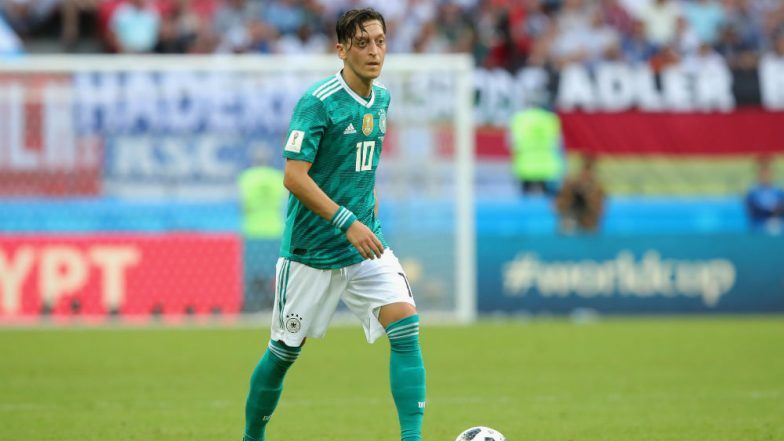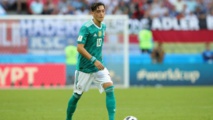Berlin (dpa) - Germans are known to have one of the world's top teams when it comes to football. But at this year's World Cup, the German team faced an embarrassing performance. At the time, one of the team's top players, striker Mesut Oezil, became embroiled in a political controversy that some feel contributed to Germany's failure abroad.
It was a drama worthy of Shakespeare: a scandalous photograph, misunderstandings, a fallen star, a bumbling football president and disappointment.
Here's how the tragedy of Mesut Oezil unfolded:
THE BEGINNING: Turkish President Recep Tayyip Erdogan's party AKP organizes a charity dinner at the Four Seasons in London. Two German football professionals, who both have Turkish origins, Mesut Oezil and Ilkay Guendogan, are among those invited.
The two young men have their picture taken with Erdogan, and give him signed shirts - Guendogan writes "for my revered president, yours respectfully" on his. The AKP publishes the pictures on Twitter, a coup for their election campaign.
THE REACTION: German-Turkish relations have been tense ever since the arrest of several German nationals in Turkey. As a result, the reaction to the pictures was swift and sharp.
Reinhard Grindel, President of the German Football Association (DFB), says he understands and respects that the players have Turkish roots. "But football and the DFB stand for values that are not observed adequately by Mr Erdogan," he says, adding that Oezil and Guendogan had been "absued" for Erdogan's campaign.
Oliver Bierhoff, the German national team's manager, says: "They were not aware of the symbolism and meaning of the picture, but of course we do not condone this behaviour and will speak to the players," he says.
It does not bode well when football and politics mix. The German far-right calls for the immediate expulsion of the two players from the national team - not the first time they will rear their head in this.
WORLD CUP BUILD-UP: Germany's national team coach, Joachim Loew, announces the squad for the upcoming World Cup in Russia one day after the scandal broke. When asked if he had considered leaving the Oezil and Guendogan off the squad list, Loew responds: "Of course not. I did not consider it. Not for a second!"
The story stays in the headlines. Just before a major game in German football, the news breaks that Oezil and Guendogan have met with German President Frank-Walter Steinmeier. Oezil releases a statement: "I grew up [in Germany] and stand by my country."
Amid the scandal and the headlines, the German team begins its preparations for the World Cup. But Oezil and Guendogan have divided the country. The far-right Alternative fuer Deutschland (AfD) use it to further turn people against immigrants.
Before the tournament, Germany plays against Austria, and Oezil scores. However, instead of the usual cheers, both he and Guendogan are met with boos. Bierhoff says the duo should not be "damned for all eternity." When the boos happen again at another game, Loew chimes in, furious: "Booing a national player is helping no one."
WORLD CUP DISASTER: Germany crashes out of the tournament after three terrible games against Mexico, South Korea and Sweden. The embarrassment is not Oezil's fault - the stats even point to Oezil as one of the team's strongest players. But someone is always the scapegoat.
THE AFTERMATH: The World Cup is over, and Germany is still reeling. Endless analysis and interviews follow. In one interview, Bierhoff makes a mistake: Loew should have thought about leaving Oezil behind. He immediately tries to backtrack, but it's too late. It looks like the DFB is closing ranks against Oezil.
Things go from bad to worse, Grindel adds fuel to the fire, demanding a statement from Oezil in another interview.
And one week later, Oezil delivers. But it's not what Grindel planned. Instead of caving in to pressure, Oezil lashes out: at the media, at sponsors, at the DFB and at Grindel. He says he does not regret taking or posting the pictures.
And then, the final blow: "With a heavy heart and after long consideration, I have decided after the recent events to no longer play for Germany internationally, for as long as I feel this racism and lack of respect," he says. Oezil ends his career as German national player - Germany's darling, the 2014 World Cup winner.
THE END: The German football world is shocked. But now it's personal, the accusation of racism is in the room. Oezil becomes a symbol for hundreds of thousands of German Turks in the country.
Things get messy, feelings are hurt - but what remains is Oezil's anger at the fact that he felt the DFB left him to deal with the difficult situation alone. The DFB is disappointed that their apparent prototype for successful integration has suddenly failed.
Loew tries to contact his former favourite pupil - to no avail. In an interview at the end of August it is obvious how disappointed he is. "I have tried to reach out to him several times ... I have not been able to get him on the phone," he says. He says Oezil was not to blame for the World Cup.
Loew tries again, but fails again. Bierhoff says: "We would have liked to talk to Mesut. But we must accept that he does not want to have that conversation with us at the moment."
Grindel finally admits his mistakes: "I should have spoken out more clearly against the racist incidents, and should have shielded Mesut Oezil. I should have found the words."
It was a drama worthy of Shakespeare: a scandalous photograph, misunderstandings, a fallen star, a bumbling football president and disappointment.
Here's how the tragedy of Mesut Oezil unfolded:
THE BEGINNING: Turkish President Recep Tayyip Erdogan's party AKP organizes a charity dinner at the Four Seasons in London. Two German football professionals, who both have Turkish origins, Mesut Oezil and Ilkay Guendogan, are among those invited.
The two young men have their picture taken with Erdogan, and give him signed shirts - Guendogan writes "for my revered president, yours respectfully" on his. The AKP publishes the pictures on Twitter, a coup for their election campaign.
THE REACTION: German-Turkish relations have been tense ever since the arrest of several German nationals in Turkey. As a result, the reaction to the pictures was swift and sharp.
Reinhard Grindel, President of the German Football Association (DFB), says he understands and respects that the players have Turkish roots. "But football and the DFB stand for values that are not observed adequately by Mr Erdogan," he says, adding that Oezil and Guendogan had been "absued" for Erdogan's campaign.
Oliver Bierhoff, the German national team's manager, says: "They were not aware of the symbolism and meaning of the picture, but of course we do not condone this behaviour and will speak to the players," he says.
It does not bode well when football and politics mix. The German far-right calls for the immediate expulsion of the two players from the national team - not the first time they will rear their head in this.
WORLD CUP BUILD-UP: Germany's national team coach, Joachim Loew, announces the squad for the upcoming World Cup in Russia one day after the scandal broke. When asked if he had considered leaving the Oezil and Guendogan off the squad list, Loew responds: "Of course not. I did not consider it. Not for a second!"
The story stays in the headlines. Just before a major game in German football, the news breaks that Oezil and Guendogan have met with German President Frank-Walter Steinmeier. Oezil releases a statement: "I grew up [in Germany] and stand by my country."
Amid the scandal and the headlines, the German team begins its preparations for the World Cup. But Oezil and Guendogan have divided the country. The far-right Alternative fuer Deutschland (AfD) use it to further turn people against immigrants.
Before the tournament, Germany plays against Austria, and Oezil scores. However, instead of the usual cheers, both he and Guendogan are met with boos. Bierhoff says the duo should not be "damned for all eternity." When the boos happen again at another game, Loew chimes in, furious: "Booing a national player is helping no one."
WORLD CUP DISASTER: Germany crashes out of the tournament after three terrible games against Mexico, South Korea and Sweden. The embarrassment is not Oezil's fault - the stats even point to Oezil as one of the team's strongest players. But someone is always the scapegoat.
THE AFTERMATH: The World Cup is over, and Germany is still reeling. Endless analysis and interviews follow. In one interview, Bierhoff makes a mistake: Loew should have thought about leaving Oezil behind. He immediately tries to backtrack, but it's too late. It looks like the DFB is closing ranks against Oezil.
Things go from bad to worse, Grindel adds fuel to the fire, demanding a statement from Oezil in another interview.
And one week later, Oezil delivers. But it's not what Grindel planned. Instead of caving in to pressure, Oezil lashes out: at the media, at sponsors, at the DFB and at Grindel. He says he does not regret taking or posting the pictures.
And then, the final blow: "With a heavy heart and after long consideration, I have decided after the recent events to no longer play for Germany internationally, for as long as I feel this racism and lack of respect," he says. Oezil ends his career as German national player - Germany's darling, the 2014 World Cup winner.
THE END: The German football world is shocked. But now it's personal, the accusation of racism is in the room. Oezil becomes a symbol for hundreds of thousands of German Turks in the country.
Things get messy, feelings are hurt - but what remains is Oezil's anger at the fact that he felt the DFB left him to deal with the difficult situation alone. The DFB is disappointed that their apparent prototype for successful integration has suddenly failed.
Loew tries to contact his former favourite pupil - to no avail. In an interview at the end of August it is obvious how disappointed he is. "I have tried to reach out to him several times ... I have not been able to get him on the phone," he says. He says Oezil was not to blame for the World Cup.
Loew tries again, but fails again. Bierhoff says: "We would have liked to talk to Mesut. But we must accept that he does not want to have that conversation with us at the moment."
Grindel finally admits his mistakes: "I should have spoken out more clearly against the racist incidents, and should have shielded Mesut Oezil. I should have found the words."









 Home
Home Politics
Politics











